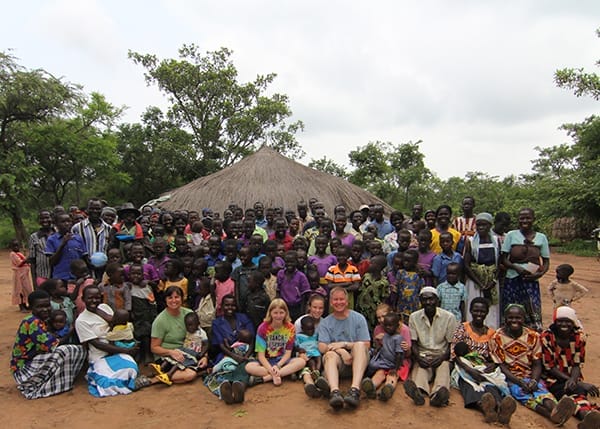We have two background stories to help you understand the fortuitous confluence of connections at work here. The first comes from Chris Dugan, WG’98. Dugan had been trying to motivate a bunch of his buddies to show up at Wharton MBA Reunion 2013. David Smith, WG’98, replied that he couldn’t attend their 15th Reunion this past May. When in jest Dugan sent him a “scathing” reply, as Dugan recalls, Smith explained that he was in South Sudan working on a charity founded by him and his family called the Pure Joy Foundation.
Dugan was amazed by his friend’s efforts—he wasn’t aware of the foundation even though they keep in touch—and promptly let us at Wharton Magazine know about them. Why us? In reading the magazine and the Wharton Blog Network, Dugan has come across a spate of stories about people who have applied their Wharton knowledge and taken action for the greater good. In Dugan’s mind, the story of Smith and his particular model at Pure Joy Foundation needed to get out to the Wharton community too.
“It feels like an audience that’s ripe for this message,” he says.
To understand Smith’s message, let’s share with you that second background story. Smith had served in the military in two tours of duty, and there (particularly in Bosnia) he learned that he wanted to make a difference when he had the ability to do so later in life. His wife Kate had spent time in Africa growing up. Put the two backgrounds together, and they decided that when their kids were old enough, they would devote their family to helping a community in Africa. They worked with Water Harvest International and nongovernmental organizations to identify such a community and found Pure, a village in South Sudan, in July 2012 (pronounced “Poo Ray”). From the start, Smith involved his whole family in the project, including his three adolescent daughters.
Pure Joy Foundation operates in a way unlike most charities. For one, Smith’s family covers all of the overhead, so every dollar that gets donated gets used. Two, they do not offer the village of Pure a handout. When they first ventured to the village in July 2012 to meet with the citizens and the government about their aim to drill a well and build a school, Smith made it clear he wasn’t in the business of giving handouts. He was more interested in giving them a hand up. They would do it together. Locals realized Smith was genuine, and that he was offering Pure a long-term, sustainable vision of a better future that villagers themselves could make happen.
“It really changes the dynamics of the conversation,” Smith says.
During a meeting on-site during the holidays last December, Smith met with the village chief, party leaders, regional chief and a senior member of the national Ministry of Education—a testament to the relationships he has already built. They told him that they have never met anyone doing what he is doing, he says.
The drinking water well became a reality in March 2013, and a solar lighting system was installed in one the classrooms, making it the only one in the region with lighting. Pure also launched a preschool in March. They are moving forward with the new school for fifth through eighth grades (currently, classes only go to fourth) and planning on providing textbooks, supplies and scholarships.

Pure’s current mud hut/classroom
On his most recent trip, Smith was amazed by how much land the villagers had cleared to make room for the school, and the government has gotten behind the idea of opening an adult education program too. This is occurring in a country where children are more likely to die before age 5 than complete the fourth grade.
Pure Joy Foundation also has initiatives involved in health (mobile health clinics), solar lighting for village residents, and religious and recreational activities.
“Now we’re just scratching the surface,” Smith says, envisioning the work as a “runway” for sustainable development. He and his family plan to be with Pure for decades, but he wants the village’s growth to continue with or without him.
He stresses, too, that the foundation serves as an example that an “average American family” can really make a difference.
Of course, not everyone can start his or her own charity in the middle of East Africa. Smith’s operation allows for matching donations, but benefactors can also sponsor projects in Pure aligned with their own passions.
Once Dugan wrapped his head around what his friend was quietly doing in South Sudan, he backed Smith’s “public-private-community” partnership model—which puts into action the ancient adage of teaching a man to fish to become self-sufficient … and also resonates with the pragmatic, rigorous mind of a Whartonite.
Editor’s note: To learn more about all of the foundation’s initiatives, visit the Pure Joy Foundation website.
























